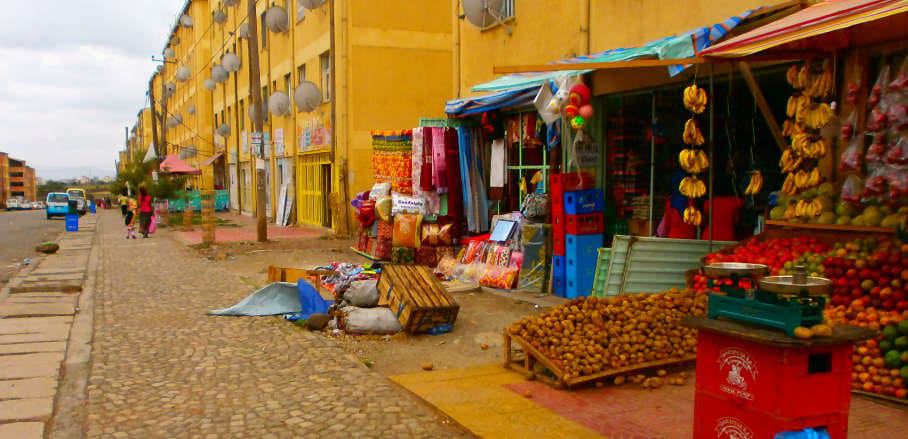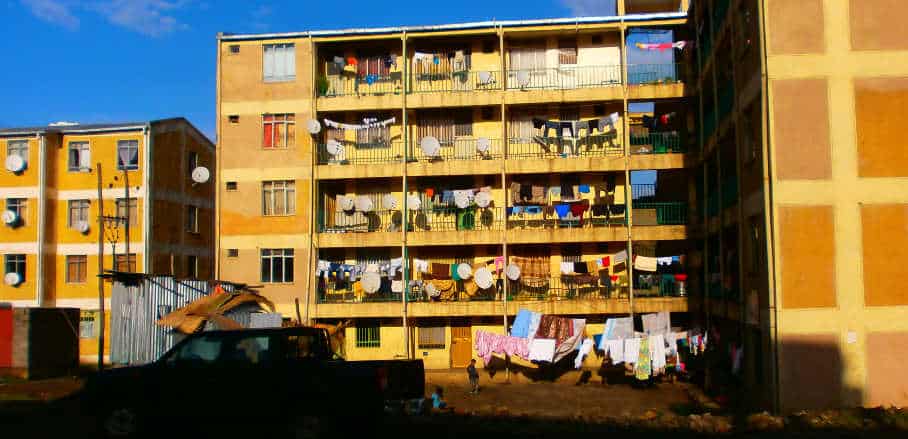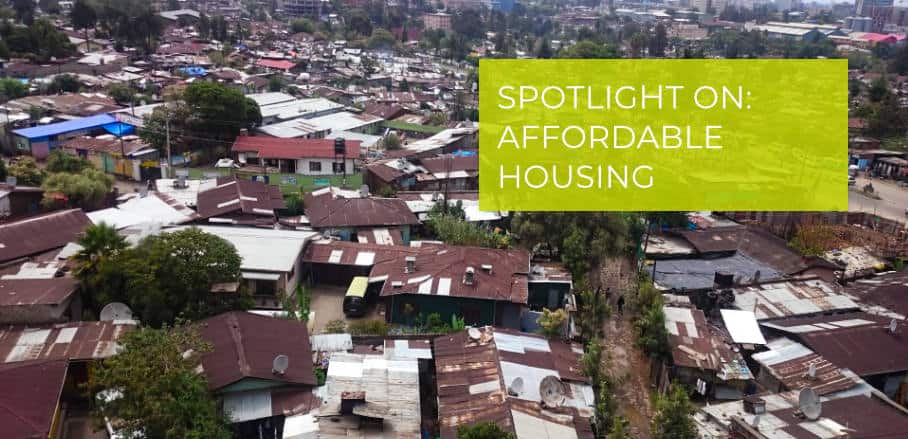Contestations over Informal Settlements: Which Way Forward? An Interview
Ethiopia is experiencing unprecedented population growth. Despite large government housing programs, there are more and more informal settlements in the country, and cases of forceful displacement and evictions are on the rise. In the virtual event “Ways forward for informal settlements”, Tania Berger from Danube University Krems discusses options for inclusive urbanisation with an international panel.
Tania Berger: The EU’s “Social Inclusion and Energy Management for Informal Urban Settlements” (SES) project centres very much on the issue of informality in housing, especially in the Ethiopian context. Within the framework of this project, we had some very interesting and sometimes even controversial debates. One of these circled around the question of whether legalising informal settlements would in fact benefit the urban poor rather than speculators and brokers. What is your experience in this regard?
Barsha Poricha, Centre for Urban and Regional Excellence (CURE), Delhi, India:
I am speaking from the Indian perspective. Our country is rapidly urbanising. This is associated with significant internal migration and stark inequalities. There have been contestations over informal settlements for over four decades now! In this context, land has become a pivotal subject and a profit-making venture as cities grew. There is a vested interest in land – demolitions and evictions happen. Only within the last decades, discussions over equity and inclusivity started coming up. Our experience in India has been that legalisation of land is extremely complex, cumbersome and time-consuming as it entails a lot of political will. The poor may – or may not! – be a party to the entire process. Data is often not available, people are not familiar with data complexities, and residents of informal settlements need to be made aware of the ongoing regularisation processes; and this empowerment process is rather difficult.
At the same time, residents of informal settlements are able to improve their situation and invest in their buildings, even if there is no legalisation but the security of tenure, such as a governmental statement that there will be no eviction for the next ten to twenty years. Let us thus juxtapose legislation on one hand and security of tenure on the other. We at CURE have experienced time and again that small scale, incremental infrastructure provisions can already lead to improved quality of life. There could also be incremental ways to legalisation, which in any case need to be people-centred. Temporary title deeds could be means of such incremental legalisation.

Shops in condominium housing estates at the outskirts of Addis Ababa © Danube University Krems
Melaku Eticha Taye, Senior expert, Ethiopian Ministry of Urban Development and Construction:
From my practical perspective, I have learned that legalisation may benefit the urban poor – or not. In the case of Ethiopia, granting tenure recognition to avoid the fear of eviction and displacement from one’s location can already be very beneficial. Such title deeds enable residents to enter negotiations over the provision of basic infrastructures, such as access to roads and water supply with local authorities. Furthermore, with better services and improved housing stock, the urban poor can increase their income, for instance from renting parts of their houses. The physical shape of settlements can likewise improve.
I coordinated the regularisation of 17,000 households in the second-tier city of Dire Dewa in Ethiopia. Plot sizes of 160 to 500 square metres were legalised. This allowed plots to be subdivided and sold so that households could improve their own houses. Thereby the physical conditions in the area improved. Also, if you look at what happens in condominiums in Addis: the urban poor cannot afford the lease payments in these condominiums, especially for larger flats and they move out. This leads to gentrification in condominiums.
Daniel Semunugus, University of Mekelle, Ethiopia, and Team Member of SES:
In Ethiopia, different cities follow different approaches towards legalisation of informal settlements. In our town of Mekelle, local authorities follow a very strict policy of immediately demolishing upcoming informal settlements and evicting all inhabitants. Mayor evictions were actually underway while we at Mekelle University were doing our case studies within the SES project. All informal settlers were forced to leave the place. We tried to track some of them and found that many moved to smaller towns and villages where it was easier for them to find accommodation that is affordable to them. This is due, in part, to the fact that Mekelle does not dispose of a significant stock of kebele houses (publicly owned, rental housing in sub-standard building stock, mostly in inner-city areas) as many other Ethiopian cities do. The situation of Mekelle thus differs remarkably from how other municipal authorities handle the issue of informality. The big challenge of informal settlements therefore remains how to reconcile people’s need for affordable housing with authorities’ task of not incentivising unplanned development.
I would like to stress a further point here: while many informal settlers may informally “buy” their houses, others just rent. The situation of these tenants in informal settlements should not be overlooked – they are normally the weakest group.

Condominium housing in Gondar, Ethiopia © Danube University Krems
Tania Berger: The issue of how to deal with informal settlements is obviously a contested one, not just in Ethiopia. Following our event’s title, I would therefore like to ask you for your suggestions for “Ways Forward” for informal settlements.
Barsha Poricha: Well, I would say that in situ slum upgrading is regarded as a preferred option where possible. Informal settlements are there, they contribute a lot to the city. From the human rights perspective, the entire discussion on the right to the city is extremely critical.
Generally speaking, there is no “one size fits all” solution for informal settlements! Different options should be considered for different informal settlements depending on their specific framework conditions, and affordable rental housing certainly can play a considerable role in this. We also need to establish partnerships between NGOs and civil society actors, governmental and administrative bodies, universities, research institutes and, first and foremost, the affected residents themselves to find suitable solutions.
Melaku Eticha Taye: In the case of Ethiopia, a specific legal framework and policies targeted at informal settlements are still missing. Furthermore, residents’ participation must be a key element in all efforts concerning informal settlements. In addition, for Ethiopia – as for many other African countries – there is a general lack of disaggregated data on informal settlements, which would be highly necessary as a basis for any decision making on the authorities’ side.
Daniel Semunugus: Besides all these points, which have rightly been pointed out here, I would like to stress the importance of capacity building in higher education. During the course of our collaboration in the SES project during the last four years, the issue of informality prominently surfaced and became a concern in our university. We have successfully developed courses, which respond to this issue. Our students, professionals, and researchers should focus on this challenge.
- Contestations over Informal Settlements: Which Way Forward? An Interview - 22. October 2020
